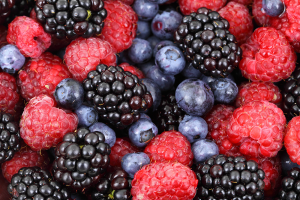From natural ingredients to evidence-based formulas, discover a selection of detox teas that have earned the stamp of approval from registered dietitians (RDs).
Detox is such a popular buzzword, mainly because of what it stands for—expelling “toxins” and “impurities” from our body that could be harmful, cause unpleasant symptoms and potentially lead to health concerns down the line. When our society discusses “detox” teas, foods, and recipes, we’re often referring to products and diets purported to cleanse the body of toxins, improve health, and promote weight loss, explains Jerry Bailey, DC, LAc, certified nutritionist, acupuncturist, chiropractic and functional medicine physician at Lakeside Holistic Health.
“In addition to the idea of getting rid of impurities from the blood in the liver, where toxins are processed for elimination, the concept also leans on the belief that certain foods and beverages can enhance this natural cleansing process,” he says. “However, it’s important to approach this topic with an understanding that the body is inherently equipped with its own efficient detoxification systems, such as the liver, kidneys, digestive system, and skin, which work tirelessly to filter and expel toxins.”
Detox teas are becoming increasingly popular because they contain key herbs that help support the body’s natural detoxification process. Plus, they go nicely with a daily HUM supplement, incorporating HUM’s Daily Cleanse to pack a true wellness punch.
HOW DOES OUR BODY DETOX?
Our body is quite efficient at detoxifying all on its own, and it does so in multiple phases. “Phase one detoxification in the liver involves the cytochrome P450 enzyme, which breaks down and converts different types of toxins (like pesticides, heavy metals, hormone metabolites/byproducts, inflammatory microbial substances called lipopolysaccharides, medication residues, etc.) into an ‘activated intermediate’ substance,” says functional dietitian and clinical herbalist Jenna Volpe, RDN, LD, CLT. This process, she explains, requires certain nutrients and antioxidants such as B vitamins, certain amino acids, glutathione, and other antioxidants.
“Phase two of detoxification in the liver involves conjugation—AKA converting these pro-inflammatory, oxidative, reactive intermediate substances into neutral substances by adding or “conjoining” them with other molecules, so they can get safely eliminated from the body as waste (typically via the gut),” she says. For this phase to occur, more nutrients are needed, specifically B vitamins, amino acids and antioxidants, as well as certain minerals such as zinc, magnesium, copper, molybdenum and selenium.
There’s technically a phase three of detoxification and this is when our gut removes the waste products that have been sent to our liver and gallbladder.
ARE THERE OTHER WAYS TO DETOX?
This question can be a bit controversial, as many health professionals believe that the only true way to detox is to allow your body to handle it solely. That being said, many other health professionals are confident that supporting the body’s natural systems is essential to our overall health and well-being.
In fact, certain herbs have been recognized for centuries for their potent properties that can support the body’s natural detoxification processes, explains Dr. Bailey. “These herbs work in synergy with the body’s existing systems, enhancing their ability to cleanse and maintain overall health.”
That’s why drinking herbal “detox” teas can be an efficient way to help support your body’s symptoms. “Herbal teas help support your body’s natural detoxification pathways and help reduce the toxic burden on the liver and kidneys by neutralizing free radicals in the body,” explains Volpe.
THE BENEFITS OF DETOX TEAS
Through these benefits, detox teas offer a practical and pleasurable method to aid and enhance the body’s natural detoxification processes, supporting overall health and promoting a sense of well-being.
MAY HELP SUPPORT HEALTHY DIGESTION
Many detox teas contain ingredients that are known to aid the digestive system, such as ginger and dandelion root. “These components work together to stimulate the production of digestive juices and bile, which helps break down food more efficiently, enhancing nutrient absorption,” says Dr. Bailey. “Furthermore, the improved digestion process reduces the likelihood of bloating, constipation, and indigestion, promoting a healthier gut environment.”
Add in HUM’s Flatter Me for extra digestive support!
MAY HELP BOOST ENERGY LEVELS
If you’re feeling particularly fatigued, sipping a detox tea may help boost your energy—specifically by eliminating toxins that can weigh down the body and impair organ function. “These teas help enhance metabolic efficiency, resulting in a more vibrant energy level throughout the day,” explains Dr. Bailey. “This energy increase is not just physical, but also mental, as a body free of toxins can lead to clearer thinking and better concentration.”
MAY HELP ENHANCE NATURAL DETOXIFICATION
Perhaps the biggest benefit of a detox tea is that it can help facilitate your body’s natural detoxification process. “Certain ingredients can aid in stimulating the liver, kidneys, and digestive tract to work more effectively in filtering and expelling toxins,” says Dr. Bailey.
“By boosting these natural processes, detox teas help maintain a cleaner internal environment, which is essential for overall health and wellbeing.”

THE BEST DETOX TEAS TO TRY
Give these nutritionist-approved detox teas a try to help rid your body of harmful toxins.
1. GINGER TURMERIC DETOX TEA
Ginger is a widely used herb that is beneficial for the digestive system. “It aids in the promotion of healthy sweating, which is crucial for detoxifying through the skin,” says Dr. Bailey. “Additionally, ginger supports the digestion and elimination of toxins by enhancing the body’s gastrointestinal motility.”
Turmeric is known for its anti-inflammatory properties. “It increases the production of vital enzymes that break down and reduce toxins in the body and its antioxidant property also protects liver cells from damage by toxins, thus supporting the liver’s health and detoxification ability,” adds Dr. Bailey.
Ingredients:
- 1 inch fresh ginger root, minced
- 1 teaspoon turmeric powder or 1 inch turmeric root, minced
- 1 tablespoon lemon juice
- 1 teaspoon raw honey (optional)
- 1 cup of boiling water
Preparation:
- Combine minced ginger and turmeric in a tea infuser for teapot.
- Pour boiling water over the ginger and turmeric. Allow it to steep for 5-10 minutes.
- Remove the infuser or strain the tea to remove the bits of ginger and turmeric.
- Stir in lemon juice and honey to taste.
- Customization: For a spicy kick, add a pinch of cayenne pepper. If you prefer a caffeine boost, include a bag of green tea during the steeping process.
2. GREEN TEA AND LEMON BALM DETOX TEA
Rich in antioxidants, particularly catechins, green tea is a powerhouse ingredient in many detox teas. “These antioxidants help neutralize harmful free radicals, reducing oxidative stress and lowering the risk of chronic diseases,” says Dr. Bailey. “Green tea has also been shown to enhance metabolic rate, aiding in weight loss by increasing the body’s ability to burn fat.”
Lemon balm is valued for its soothing properties that reduce stress and anxiety, promoting a sense of calmness and is known for improving digestive health by relieving indigestion, bloating, and discomfort, explains Dr. Bailey. “It also supports liver health by stimulating the liver to efficiently process and eliminate toxins from the body.”
Ingredients:
- 1 green tea bag or 1 tablespoon loose green tea leaves
- 1 tablespoon fresh lemon balm leaves, or 1 teaspoon dried
- 1 teaspoon lemon juice
- Honey or stevia to sweeten (optional)
- 1 cup of boiling water
Preparation:
- Place the green tea and lemon balm leaves in a tea infuser or directly in a cup.
- Pour hot water over the tea leaves and allow them to steep for 3-5 minutes.
- Remove the infuser or strain to remove loose leaves.
- Add lemon juice and sweetener to taste, stirring well.
3. DANDELION BURDOCK TEA
Dandelion root helps protect and preserve liver function. “For example, while the exact mechanism isn’t yet clear, studies have uncovered that taking dandelion root extracts resulted in reduced blood test markers that would indicate liver injury as well as reduced overall levels of oxidative stress on liver tissue in rats,” says Volpe.
Ingredients:
- 1 teaspoon dried dandelion leaves
- 1 teaspoon dried dandelion roots
- 1 teaspoon dried burdock root
- Optional: 1-inch slice of fresh ginger root
- 24 ounces (3 cups) of filtered/purified water or spring water
Directions:
- Add all ingredients to a medium stovetop pot, on low to medium heat.
- Bring to a simmer, and reduce heat to low.
- Continue to simmer for a minimum of 15-20 minutes.
- Strain, and drink 1 to 3 cups daily, ~15-30 minutes before meals to help optimize digestion and support natural detoxification.
- Let any remaining tea cool down before transferring to a sealed glass container (such as a mason jar) in a fridge for up to 3 days.
HOW TO INCORPORATE DETOX TEAS INTO YOUR DAILY ROUTINE
Follow these tips if you’re looking to add detox tea to your routine.
1. CONSULT A QUALIFIED EXPERT
Before consuming any new herbs, Volpe recommends consulting a qualified healthcare practitioner who is trained in clinical nutrition and functional medicine. “Herbs are powerful, but they aren’t always safe and beneficial to consume—especially for those with specific medical conditions or taking medication which may interact negatively with an herb,” she says. “For example, taking certain herbs which impact liver detoxification could change the way drugs get metabolized by the body and some herbs could alter liver detoxification in ways that make a medication get excreted too quickly (leading to ineffectiveness).”
2. START SLOW AND LOW
Volpe finds that lots of her clients have a tendency to want to go from 0-60, when it comes to adding a new herb/supplement into their routine because they want to heal faster. “At the end of the day, even when herbs are well-researched, we can never know with 100 percent confidence and certainty how our body is going to respond to a new herb or supplement because of our biochemical individuality,” she says. “For example, if somebody is allergic to an herb, or they end up having an adverse reaction, they’re much better off taking a few sips of a tea versus drinking a full serving of the tea which could potentially lead to a more severe reaction.” For this reason, she recommends starting at the lowest dose possible and titrating up gradually to a goal therapeutic dose (with clinical supervision from a qualified expert).
3. OPT FOR ORGANIC, THIRD-PARTY TESTED PRODUCTS
Not all herbs are created equal. “Conventional herbs are often sprayed with chemical pesticides and herbicides which actually increase the toxic burden on our liver,” Volpe warns. “Going organic means reducing the likelihood of consuming certain potentially harmful chemical residues which may otherwise get extracted in tea.” She also recommends choosing a product that has been third-party tested, which means that an independent lab or organization has verified its quality, purity, potency and safety, since the herbal supplement industry isn’t currently regulated by the FDA.




